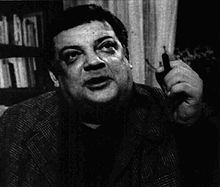Satyricon (opera)
| Satyricon | |
|---|---|
| Chamber opera by Bruno Maderna | |
 Maderna in 1972 | |
| Librettist | Ian Strasfogel |
| Language |
|
| Based on | Satyricon |
| Premiere | 16 March 1973 |
Satyricon is a chamber opera by Bruno Maderna with a libretto adapted by Ian Strasfogel and the composer from Petronius's Satyricon. It was written during Maderna's last illness in 1973 and premièred as part of the Holland Festival on 16 March 1973, in Scheveningen, Netherlands.
The work consists of 16 unordered numbers (with the option of placing taped numbers between them) and the collage effect extends to the music, which relies heavily on pastiche. It is uncertain to what extent this "open" form was a product of the composer's inclination to semi-improvisational music theatre, or to the urgency of composition at a time when Maderna's terminal illness was increasingly becoming evident.[1] There are four singers, employing respectively English and German, French, wordless vocalise, and Latin: the host Trimalchio (tenor, doubling as the merchant Habinnas), his wife Fortunata (mezzo-soprano), Criside (soprano), and Eumolpus (bass). At its premiere, the role of Fortunata was created by Débria Brown. It is suggested that tape music may be used between scenes; the 2004 production in Darmstadt included dialogue and a number of additional spoken roles.([2][3][4][5][6][7]
References
Sources
- Anon. 2004a. "Die Dekadenz lädt zum musikalischen Bankett". Frankfurter Neue Presse (29 May). (in German)
- Anon. 2004b. "Dekadenz als weltgeschichtliche Konstante". Egotrip (April). (in German)
- CLA. 2004. "Jahrmarkt der Eitelkeiten". Wiesbadener Kurier (19 April). (in German)
- Fearn, Raymond. 1992. "Satyricon". The New Grove Dictionary of Opera, 4 vols., edited by Stanley Sadie. London: Macmillan.ISBN 0-333-48552-1. Reprinted as Fearn, Raymond (2001). "Satyricon". In Sadie, Stanley; Tyrrell, John (eds.). The New Grove Dictionary of Music and Musicians (2nd ed.). London: Macmillan Publishers. ISBN 978-1-56159-239-5.
- Holst, Jens. 2004. "Die Reichen mit den Schweinsnasen". Frankfurter Rundschau (19 April). (in German)
- Kienzle, Siegfried. 2004. "Die noblen Gäste im Schweinestall". Wiesbadener Tagblatt (19 April). (in German)
- Zietsch, Heinz. 2004. "Blähungen und Katerstimmung". Darmstädter Echo (19 April). (in German)
Further reading
- Knessl, Lothar. 2001. "Zu Bruno Madernas Satyricon". In Stimme und Wort in der Musik des 20. Jahrhunderts, edited by Hartmut Krones. Wiener Schriften zur Stilkunde und Aufführungspraxis: Sonderreihe "Symposien zu Wien Modern" 1. Vienna: Böhlau, 2001. ISBN 3-205-99387-X
- Maderna, Bruno. 1992. Satyricon. Salambert SCD9101. Paul Sperry, Milagro Vargas, Liliana Oliveri, Aurio Tomicich, conducted by Sandro Gorli, Divertimento Ensemble.
- Maderna, Bruno. 2003. "Entretien à la radio hollandaise NOS après le Satyricon", French translation by Laurent Feneyrou. In Musique et dramaturgie: Esthétique de la représentation au XXe siècle, edited by Laurent Feneyrou, 595–598. Esthétique 7. Paris: Publications de la Sorbonne. ISBN 2-85944-472-6. Originally published in Italian in Bruno Maderna: Documenti, edited by Mario Baroni, Rossana Dalmonte, and Francesca Magnani. Atti del Convegno Internazionale Bruno Maderna. Milan: Suvini Zerboni, 1985.
- Mathon, Geneviève. 1997. "Une esthétique de la fragmentation: Le Satyricon de Bruno Maderna". Les Cahiers du CIREM, nos. 40–41 (September): 166–170.
- Mathon, Geneviève. 2003. "À propos du Satyricon de Bruno Maderna". In Musique et dramaturgie: Esthétique de la représentation au XXe siècle, edited by Laurent Feneyrou, 571–593. Esthétique 7. Paris: Publications de la Sorbonne. ISBN 2-85944-472-6
- Poel, Piet Hein van de. 2003. "Bruno Maderna sur le Satyricon: 'Pop art' en musique", translated by Rosalie Siblesz. In Musique et dramaturgie: Esthétique de la représentation au XXe siècle, edited by Laurent Feneyrou, 599–601. Esthétique 7. Paris: Publications de la Sorbonne. ISBN 2-85944-472-6
